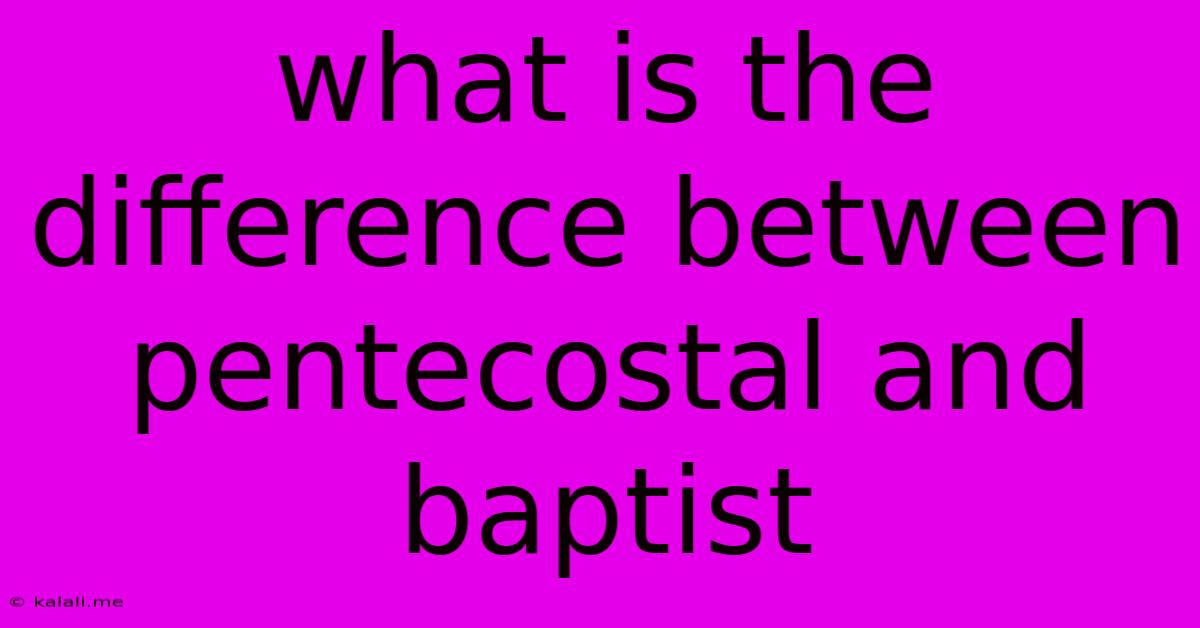What Is The Difference Between Pentecostal And Baptist
Kalali
Jun 09, 2025 · 3 min read

Table of Contents
Pentecostal vs. Baptist: Understanding Key Differences
This article explores the core distinctions between Pentecostal and Baptist denominations, two significant branches within Protestant Christianity. While both share a Protestant heritage emphasizing the Bible as the ultimate authority, several key theological and practical differences set them apart. Understanding these differences can provide valuable insight into the rich tapestry of Christian belief and practice.
Theological Distinctions: The Holy Spirit and the Role of Experience
One of the most significant differences lies in the understanding and experience of the Holy Spirit. Pentecostalism emphasizes the baptism of the Holy Spirit, often accompanied by outward manifestations like speaking in tongues (glossolalia), prophecy, and divine healing. These experiences are seen as evidence of the Spirit's presence and power, integral to the Christian life. Baptist traditions, while acknowledging the Holy Spirit's work, generally don't emphasize these outward manifestations to the same extent. The focus is often on a more subdued, inward experience of the Spirit's grace and guidance.
Another key difference centers on sacraments. Most Baptist churches recognize only Baptism (usually by immersion) and Communion (Lord's Supper) as ordinances. Pentecostal churches also generally recognize these two, but may place a different emphasis on their significance, sometimes viewing them through the lens of empowerment and spiritual gifts. Some Pentecostal denominations may also incorporate other practices such as foot washing.
Finally, the understanding of salvation is subtly different. While both groups believe in salvation through faith in Jesus Christ, Pentecostalism sometimes emphasizes a more emotional and experiential approach to conversion, while Baptists tend toward a more intellectual understanding of the acceptance of Christ's sacrifice.
Church Governance and Practices: Structure and Authority
The structure and governance of Pentecostal and Baptist churches also differ considerably. Baptist churches generally operate under a congregational model, with local churches enjoying significant autonomy. Decisions are typically made by the church members themselves. Conversely, Pentecostal churches exhibit a wider range of governance structures, from congregational to hierarchical systems, often with a stronger emphasis on centralized leadership and oversight from regional or national organizations.
This difference in governance extends to the role of clergy. While both traditions value pastoral leadership, Pentecostal churches often place a greater emphasis on the role of charismatic leaders and evangelists, who may be gifted in preaching, healing, or other spiritual manifestations. Baptist pastors typically focus on preaching, teaching, and shepherding their congregations.
Worship Styles: Expression and Tradition
The worship styles of Pentecostal and Baptist churches also reflect their differing theological emphases. Pentecostal services are often characterized by spontaneous expressions of worship, including singing, dancing, and speaking in tongues. The atmosphere tends to be more emotionally charged and participatory. Baptist services, while certainly enthusiastic, generally maintain a more structured and traditional format with hymns, prayers, and sermons as the central elements. The emphasis remains on reverent worship and the proclamation of God's word.
Conclusion: A Spectrum of Belief
While clear distinctions exist between Pentecostal and Baptist traditions, it's crucial to remember that these are broad generalizations. Within both denominations, significant diversity exists in practices, beliefs, and interpretations. Understanding these core differences provides a framework for appreciating the rich tapestry of Christian faith and the varied ways individuals experience and express their relationship with God. Further research into specific denominations within Pentecostalism and Baptist traditions will reveal even greater nuances and variations.
Latest Posts
Latest Posts
-
Where Can I Get A Survey Of My Property
Jun 09, 2025
-
Can Electromagnetic Waves Travel Through A Vacuum
Jun 09, 2025
-
What Did Jesus Say About Marriage
Jun 09, 2025
-
How To Turn On Irrigation System Manually
Jun 09, 2025
-
Do I Need Plastic Behind Moisture Resistant Drywall
Jun 09, 2025
Related Post
Thank you for visiting our website which covers about What Is The Difference Between Pentecostal And Baptist . We hope the information provided has been useful to you. Feel free to contact us if you have any questions or need further assistance. See you next time and don't miss to bookmark.